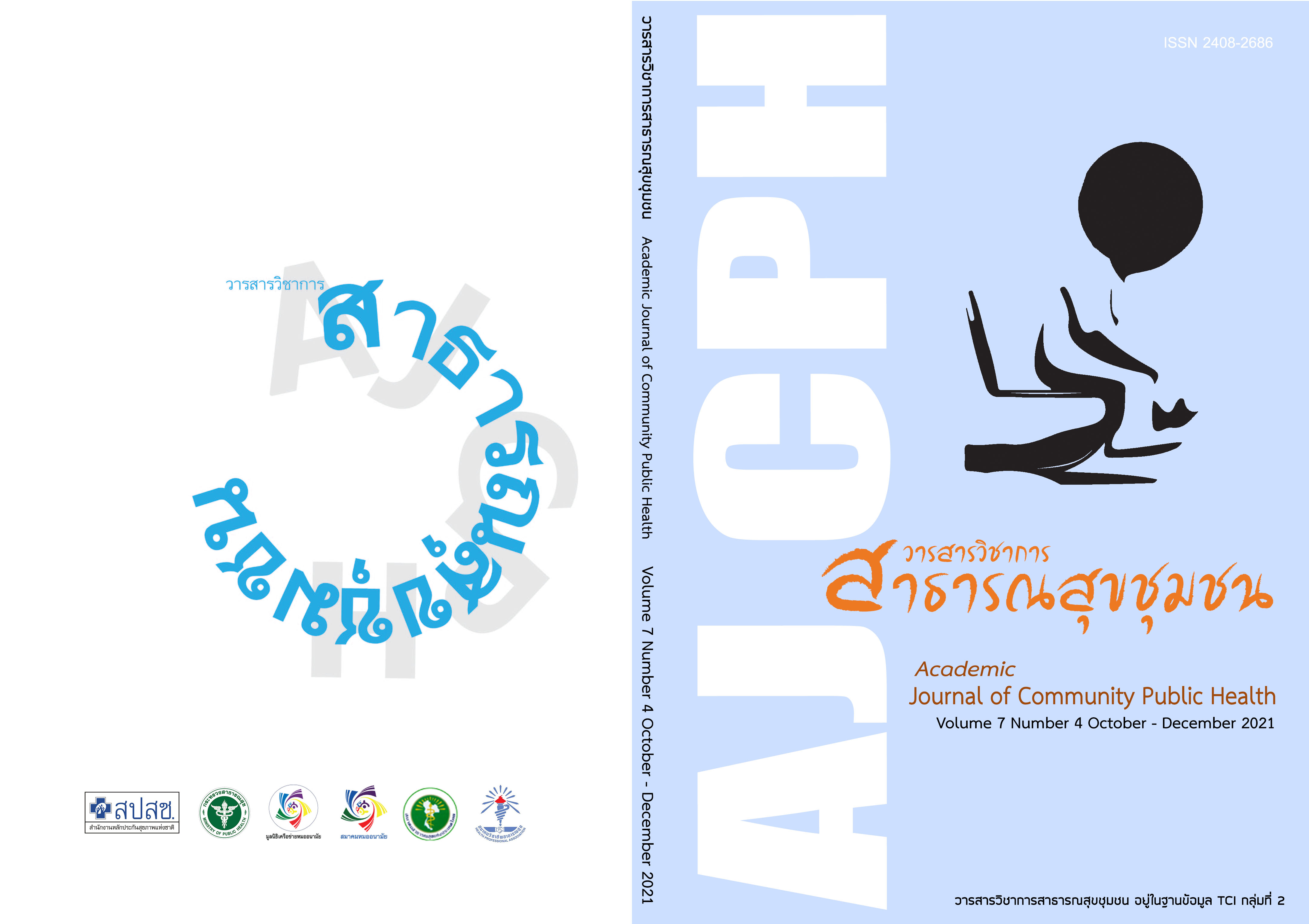ผลของโปรแกรมการเสริมสร้างความสามารถในการดูแล ของอาสาสมัครผู้ดูแลผู้สูงอายุโรคเรื้อรังภาวะพึ่งพิง
คำสำคัญ:
โปรแกรมการเสริมสร้างความสามารถในการดูแล, อาสาสมัครผู้ดูแล, ผู้สูงอายุที่มีภาวะพึ่งพิงบทคัดย่อ
ผู้สูงอายุและโรคเรื้อรังมีอุบัติการณ์เพิ่มขึ้น อาสาสมัครผู้ดูแลเป็นบุคคลสำคัญสำหรับการดูแลผู้สูงอายุในระดับปฐมภูมิ การศึกษาวิจัยนี้เป็นการวิจัยเชิงกึ่งทดลองเพื่อศึกษาผลของโปรแกรมการเสริมสร้างความสามารถในการดูแลของอาสาสมัครผู้ดูแลผู้สูงอายุโรคเรื้อรังที่มีภาวะพึ่งพิงต่อความสามารถในการดูแลและมุมมองด้านบวกในการดูแล กลุ่มตัวอย่างแบบเฉพาะเจาะจง จำนวน 22 คน ซึ่งอาศัยอยู่ชุมชนเทศบาลตำบลเขาพระงาม อ.เมือง จ.ลพบุรี โปรแกรมแบ่งออกเป็น 2 ระยะ ระยะที่1 กิจกรรมประกอบ การให้ความรู้และฝึกทักษะการดูแล จำนวน 2 สัปดาห์ และการฝึกปฏิบัติการดูแลผู้สูงอายุโรคเรื้อรังที่มีภาวะพึ่งพิง จำนวน 4 สัปดาห์ ระยะที่ 2 จำนวน 2 วัน กิจกรรมประกอบด้วย กิจกรรมการแลกเปลี่ยนประสบการณ์การดูแล และการเสริมสร้างมุมมองด้านบวกในการดูแล เครื่องมือที่ใช้ในการเก็บรวบรวมข้อมูล ประกอบด้วย แบบประเมินความสามารถในการดูแลสุขภาพผู้สูงอายุโรคเรื้อรังที่มีภาวะพึ่งพิง และแบบประเมินมุมมองด้านบวกในการดูแล สถิติที่ใช้ในการ วิเคราะห์ข้อมูลคือ ค่าเฉลี่ย ค่าเบี่ยงเบนมาตรฐาน และการวิเคราะห์ค่าเฉลี่ยอันดับที่ (Wilcoxon singned-rank test)
ผลการวิจัยพบว่า 1) อาสาสมัครผู้สูงอายุโรคเรื้อรังมีความสามารถในการดูแลภายหลังการทดลองเสร็จสิ้นทันทีสูงกว่าก่อนการทดลอง อย่างมีนัยสำคัญทางสถิติ 2) อาสาสมัครผู้สูงอายุโรคเรื้อรังมีมุมมองด้านบวกในการดูแลภายหลังการทดลองเสร็จสิ้นทันทีสูงกว่าก่อนการทดลองอย่างมีนัยสำคัญทางสถิติ ผลการวิจัยชี้ให้เห็นว่า อาสาสมัครผู้ดูแลผู้สูงอายุโรคเรื้อรัง สามารถปฏิบัติงานร่วมกับทีมสุขภาพได้ โดยการสนับสนุนให้บุคคลเหล่านี้ให้คงไว้ซึ่งการมีทัศนคติที่ดีและความสามารถด้านการดูแลผู้สูงอายุในชุมชนให้เป็นไปอย่างยั่งยืน
เอกสารอ้างอิง
เอกสารอ้างอิง
Foundation of Thai Gerontology Research and Development Institute. Situation of the Thai Elderly 2014. [cited 2021 March 10]. Available from: www.thaitgri.org.pdf
Srithamrongsawat S, Bundhamcharoen K, Sasat S, Amnatsatsue K. Community care model for older people in Thailand. 2009; 22-31. (in Thai).
Aman Z, Liew S M, Ramdzan S N, Philp L, Khoo E M. The impact of caregiving on
caregivers of older persons and its associated factors: a cross-sectional study. Singapore Medical Journal 2020; 61(5): 238-245.
Phalasuekand R, Thanomchayathawatch B. A Family Model for Older People Care. 2017; 135-150. (in Thai).
National statistical office ministry of information and communication technology. The
survey of the older persons in Thailand. 2014; 5-6. (in Thai).
Woldie M, Feyissa G T, Bitiya Admasu B, Hassen K, Mitchell K, Mayhew S, McKee M,
Balabanova D. Community health volunteers could help improve access to and
use of essential health services by communities in LMICs: an umbrella review.
Health Policy and Planning 2018; 33: 1128–1143. doi: 10.1093/heapol/czy094
Srithamrongsawat S, Bundhamcharoen K, Sasat S. Projection of Demand and
Expenditure for Institutional Long-term Care in Thailand. Health Care Reform
Project:Thai-European Cooperation for Health. 2009. (in Thai).
World Health Organization. Community health workers: What do we know about
them? The state of the evidence on programmes, activities, costs and impact on health outcomes of using community health workers. Geneva: World Health Organization; 2007.
Amy McGarvey, Véronique Jochum, John Davies, Joy Dobbs and Lisa Hornung. Time
well spent a nation survey on the volunteer experience. NCVO 2019; 1-100.
Zhao L, Xie H, Dong R. Volunteers as caregivers for elderly with chronic diseases: An
assessment of demand and cause of demand. International journal of nursing sciences 2015; 2: 268-272.
Pankong O, Khrabiad K, Amphawa K, Sangsee P. Effectiveness of Care in Older Adults
with Chronic Illness by Community Participation. Journal of Health and Nursing
Research 2020; 36(3): 94-140. (in Thai)
Pattarapong S. Practices of volunteers caring for older persons at home in San
Kampaeng District, Chiang Mai Province [thesis]. Chiang Mai: Chiang Mai University; 2007. (in Thai)
Tarlow BJ, Wisniewski SR, Belle SH, Rubert M, Ory MG, Gallagher-Thompson D.
Positive aspects of caregiving: contributions of the REACH project to the development of new measures for Alzheimer’s caregiving. Research on Aging. 2004; 26: 429–453.
Pankong O, Pothiban L, Sucamvang K, Khampolsiri T. A Randomized Controlled Trial
of Enhancing Positive Aspects of Caregiving in Thai Dementia Caregivers for Dementia. Pacific Rim International Journal Nursing Research 2018; 22(2): 131-143.
Karuhadej P, Popijan M, Danpradit P. Effectiveness of increase health volunteer ability
program in basic care for the dependent elderly in the communities, Nakhon
Pathom Province, Thailand. Journal of Health Research 2019; 33(3): 219-227.
Kevin, Brown, Russell, Hoye, Matthew, Nicholson. Self-Esteem, Self-Efficacy, and
Social Connectedness as Mediators of the Relationship Between Volunteering and Well-Being. Journal of Social Service Research 2012; 38(4): 468-483.
Escajeda K. The Role of the Community Health Worker: An Educational Offering.
College of Nursing and Health Sciences. Available at: https://scholarworks. uvm.edu/cnhsmp. Accessed March 28, 2021.
Janpipatpong T. Personal and Social Environmental Factors Related to Volunteering Behavior of Village Health Volunteer in Wiangnue Municipality, Wiangchai District,
Chiangrai Province. Journal of Behavioral Science for Development 2019; 11(1): 1-14. (in Thai).



